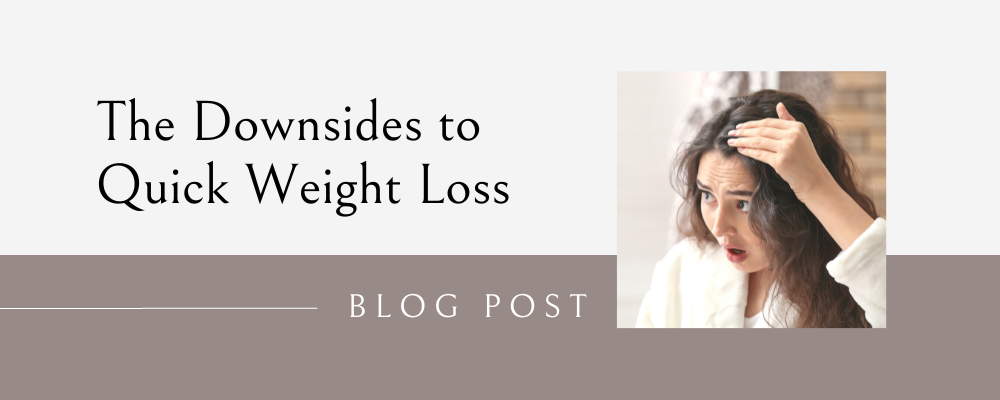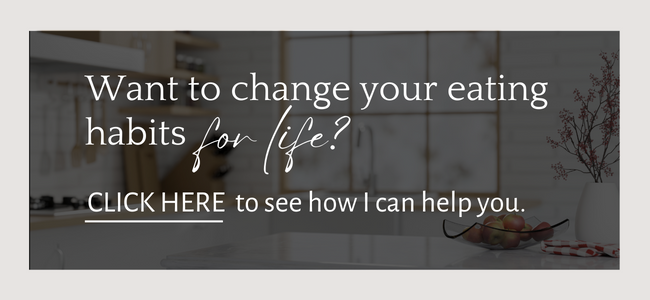The Downsides to Quick Weight Loss (& What to do Instead)

The Downsides to Quick Weight Loss (& What to do Instead)
Sure it’s fun to see the number on the scale drop quickly when you start your weight loss journey, but there are some major downsides to quick weight loss.
Often, the quick weight loss in the beginning doesn’t last. (I’ll explain why in this blog post.)
Also, it can have some seriously negative effects on how you feel physically, and also your thoughts later on.
I’ll share the better alternative, which is forming weight loss habits that will provide long-lasting results. Plus, you’ll see why slow and steady is the way to go, and how ultimately, you’ll love the slower process and the steady results so much more.
*And just a note, if you’re NOT actively trying to lose weight, but noticed that you’ve lost weight recently without explanation, please bring this to your medical provider’s attention.
The Quick Weight Loss Trend
The average weight loss trend is that you lose more weight in the beginning of the weight loss journey each week and then that tapers down.
With a quick weight loss trend, this occurs as well, but to lose a lot of weight each week, you must burn significantly more calories than you consume. This means making changes to your diet (or exercise) that are very significant changes than what you were used to.
Significant changes right away are difficult for your brain to maintain, because the human brain doesn’t like change. So the larger the change, the more resistant your brain will be, making it less likely to be able to keep up with.
This makes it more likely to quit.
Think about it like this. If you went from only being able to walk no more than a mile at a time and decided that you were going to train for a marathon, you wouldn’t go from walking a mile to trying to run 5 miles, right? That’s going to be pretty difficult and not to mention, painful.
When something is really difficult and especially if it’s uncomfortable or painful, your brain will resist. The human brain likes to avoid discomfort just as it likes to avoid change.
When your brain resists, it will come up with every excuse in the book NOT to do something. So what happens with that weight loss journey is that it’ll come to a halt real quick if the weight loss is too quick.
That’s one of the main downsides of quick weight loss. It just increases the likelihood that you won’t maintain, which can certainly cause the weight to return. This just causes a painful emotional rollercoaster of frustration.
- LISTEN OR READ: Habit Change for Weight Loss (Podcast Episode)
- LISTEN OR READ: Why Willpower Fails (Podcast Episode)
Physical Side Effects
Next on the list of downsides to quick weight loss is the physical side effects of losing weight very quickly.
Below is a list of some (not all) of the physical side effects:
- Hair loss
- Muscle loss
- Headaches
- Irritability
- Weakness
- Dizziness
- Fatigue
- Hormonal imbalances causing menstrual irregularities
- Anxiety (I found some research suggesting this)
So yes, losing 20 lbs. in 2-3 weeks might sound appealing until you factor in these physical side effects.
And think about it….that hair loss doesn’t just return quickly, nor does the muscle loss. Is the trade-off really worth it?
- GET WEEKLY TIPS: Eating Habit and Weight Loss Tips
- READ: How to Feel Better About Your Body (Blog Post)
Healthy Weight Loss Habits
The more effective (and enjoyable) weight loss alternative is to form healthy weight loss habits. This means you lose less weight in a shorter period of time, but you’re able to keep those changes going until you reach the weight that feels really good to you.
Plus, you’ll be able to maintain MUCH more easily.
With habits, repetition is key, so the more you can repeat something, the more likely it will become habit.
When you make smaller changes to your eating habits (and also exercise habits, sleep habits, hydrations habits, etc.), your brain isn’t so resistant to them. This means it’ll be way easier to keep up with those changes for long enough to actually create new eating habits.
Also, if you’re trying to increase exercise, sleep and hydration, small changes makes it more likely to actually create these habits too.
You’ll be able to repeat these things more than you would if these were large changes that you’re not used to.
In addition to the actions that become habits, and certainly breaking “bad” habits, comes habits with the way you think about yourself, your weight, food, etc.
This is super important with weight loss results, because your thoughts will always affect your results. That’s because your thoughts cause how you feel. How you feel determines your actions, reactions or inaction. Your actions, reactions or inaction determine your results.
So this is something I help clients with as an Eating Habit and Weight Loss Coach. Because it’s not JUST about the actions, reactions, inactions, but also about changing how you think and feel.
- LISTEN OR READ: 5 Crucial Weight Loss Habits (Podcast Episode)
- LISTEN OR READ: 5 Mindset Shifts to Help You Lose Weight (Podcast Episode)
- LISTEN OR READ: Thought Habits and Your Results (Podcast Episode)
Final Notes (& More Tips)
I know it’s fun to see quick weight loss, but slow and steady weight loss is more effective and more pleasant in the long-run. Weight loss is something you want to keep for life, right? Rather than losing weight, gaining it back, losing it again, gaining it back, etc.
So look at it as a long-game. You have your whole life ahead of you, so start now, but keep it steady.
To receive weekly tips and other special invitations to help you change your eating habits, mindset and lose weight, I invite you to get on the list here.
Other career women have told me that they’ve made some amazing changes just from the tips and inspiration from my weekly emails. I’d love for you to do the same. Click here to get those weekly tips.

KATE JOHNSTON
Weight Loss Coach, PA-C
Helping busy career women lose weight simply, by changing their eating habits (and mindset) for life.
Want to see how I can help you specifically? Just with the free consultation, you’ll get insight, clarity, and direction that’ll move you forward.

